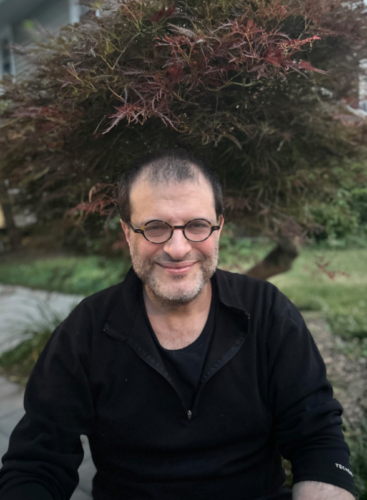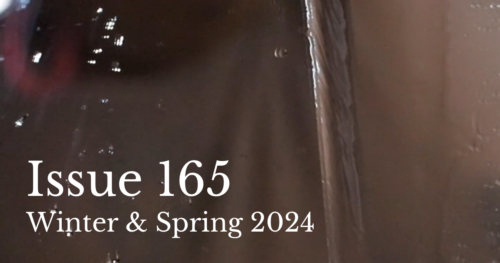What do we callthose limpid flowzy flowersthat look like someone took notebook paperworn soft from pen-pressure—writing and crossing out,writing and crossing out—weeks of heartneed drafting—then, seeing their words also had changed, in the way weather doesstaying weather, continuouslyforward, away from itself,in an electric-storm frenzy shredded it, abandoned itscatteredaround the bareunrealized trunkof whatever idea had birthed itlike drought-shocked, not autumn-full, leavesbefore, like words come back to a voice after crying, returningto gather the scraps in a pile, and with their last inkdyeing them a gentle wash of pale blueand gluing them—absentmindedly now—not inattentive,absentminded the other way, absentminded past habit, absentmindednear to the point that someone watching, if anyone were, couldn’t sayfor sure it was a person there doing it and not their body hove freeof the held breath one’s name is—absentminded past the pointwhere concentration could matter any morethan the pull and swell of tide could to a bird’s altitude—into a moment vacant and wide as an insomniac’s dawn,the closest thingthis world has seento a halo?
Discomposed
Feature Date
- June 25, 2024
Series
Selected By
Share This Poem
Print This Poem
Copyright © 2024 by Stuart Greenhouse.
All rights reserved.
Reproduced by Poetry Daily with permission.

Stuart Greenhouse lives in New Jersey with his family, writing about astronomy, memory and the distances inherent in chronic illness. The author of two chapbooks, What Remains (PSA, 2005) and All Architecture (End & Shelf Press, 2008), poems have most recently appeared in Asimov’s Science Fiction, Boulevard, and Massachusetts Review.

Winter/Spring 2024
Evanston, Illinois
Northwestern University
Poetry Editor
Daniel Fliegel
Managing Editor
Joshua Bohnsack
Assistant Managing Editor
Kayla Kumari Upadhyaya
TriQuarterly is the literary magazine of Northwestern University. It is edited by students in the Litowitz MFA+MA Graduate Creative Writing Program and the MFA in Prose and Poetry in the School of Professional Studies. Alumni of these programs and other readers also serve as editorial staff. Available around the world, TriQuarterly has remained "an international journal of writing, art, and cultural inquiry. TQ has created an online archive of its own history by publishing individual works from its past, sometimes with new accompanying comments by the writers. The Northwestern University Library has digitized the entire history of the journal.
As a web journal, TQ has the capacity to add audio, video, and a variety of new and frequently uploaded content to supplement its schedule of publishing issues twice a year.
In 1958, the "tri-quarterly" was so named because its original form as a student magazine was published in each of the three quarters of Northwestern's academic year, and not in the fourth quarter, summer. This name has been belied at times by the magazine's real publishing schedule, but now TQ has altered the tradition quite deliberately to one of semi-annual publishing of discrete issues and frequent updating with new reviews, interviews, blog posts, and excerpts from longer works. And for the first time, new writing published in this journal can be read everywhere there is web access.
Poetry Daily Depends on You
With your support, we make reading the best contemporary poetry a treasured daily experience. Consider a contribution today.



